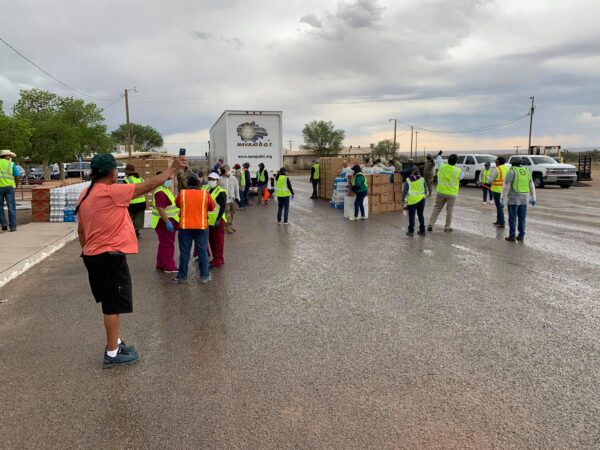
- Details
- By Native News Online Staff
WINDOW ROCK, Ariz. — Numbers released by the Navajo Nation on Sunday night report the number of positive COVID-19 cases for the Navajo Nation has surpassed 6,000 with 6,020 cases. On Sunday, 102 new cases have been added to the total. The Navajo Nation first reported it first cases of COVID-19 on March 17, 2020.
Also reported were three more deaths from COVID-19. The death toll stands at 277 as of Sunday.
The good news is of the 6,020 cases, almost half, 2,727 have recovered.
Navajo Nation cases by Service Unit:
- Chinle Service Unit: 1,554
- Crownpoint Service Unit: 573
- Ft. Defiance Service Unit: 345
- Gallup Service Unit: 1,020
- Kayenta Service Unit: 896
- Shiprock Service Unit: 1,010
- Tuba City Service Unit: 487
- Winslow Service Unit: 127
* Eight residences are not specific enough to place them accurately in a Service Unit
The Navajo Nation’s daily curfew remains in effect from 8:00 p.m. to 5:00 a.m. seven days a week. Navajo Nation Police continue to enforce the daily curfew and may issue a citation to curfew violators.
Navajo Nation President Jonathan Nez and Vice President Myron Lizer continue to urge all Navajo Nation residents to stay home, wash your hands, wear your protective masks in public, practice social distancing, and adhere to the daily curfew.
"In areas of the country that opened up before Memorial Day, they are now seeing spikes in new cases. Don’t be foolish and don’t let your guard up. This pandemic is far from over and if we become too relaxed then we are certain to see a second wave of the virus. I say this because I want you to be safe and I want our elders to be healthy – hold each other accountable for each other’s actions. Please remain diligent and let’s keep fighting this virus together," Navajo Nation President Jonathan Nez said on Sunday evening.
Since the COVID-19 pandemic began on the Navajo Nation, President Nez and Vice President Myron Lizer have relied on data and reports from health care experts to determine the need for public health emergency orders and restrictions to help slow and prevent the spread of the virus.
To help families on the Navajo Nation remain home as much as possible, the Nez-Lizer team has distributed food, bottled water, and other essential supplies to 13,731 families so far. More distributions are planned in the coming days.
For more information, including reports, helpful prevention tips, and more resources, please visit the Navajo Department of Health’s COVID-19 website at http://www.ndoh.navajo-nsn.gov/COVID-19. To contact the primary Navajo Health Command Operations Center, please call (928) 871-7014.
To Donate to the Navajo Nation
The official webpage for donations to the Navajo Nation, which has further details on how to support the Nation’s Dikos Ntsaaígíí-19 (COVID-19) efforts is: http://www.nndoh.org/donate.html.
For More Information
For more information including reports, helpful prevention tips, and more resources, please visit the Navajo Department of Health’s COVID-19 website at http://www.ndoh.navajo-nsn.
For up to date information on impact the coronavirus pandemic is having in the United States and around the world go to: https://www.worldometers.info/coronavirus/country/us/?fbclid=IwAR1vxfcHfMBnmTFm6hBICQcdbV5aRnMimeP3hVYHdlxJtFWdKF80VV8iHgE
For up-to-date information about COVID-19, Native News Online encourages you to go to Indian Health Service’s COVID-19 webpage and review CDC’s COVID-19
More Stories Like This
Native News Weekly (August 25, 2024): D.C. BriefsDeb Haaland Earns Endorsement From Communications Workers of America Local 7076
University Soccer Standout Leads by Example
Two Native Americans Named to Democratic Congressional Campaign Committee's“Red to Blue” Program
Cheyenne River Youth Project Hosts Young Women’s Winter Camp as Part of Lakota Culture Internship
Help us defend tribal sovereignty.
At Native News Online, our mission is rooted in telling the stories that strengthen sovereignty and uplift Indigenous voices — not just at year’s end, but every single day.
Because of your generosity last year, we were able to keep our reporters on the ground in tribal communities, at national gatherings and in the halls of Congress — covering the issues that matter most to Indian Country: sovereignty, culture, education, health and economic opportunity.
That support sustained us through a tough year in 2025. Now, as we look to the year ahead, we need your help right now to ensure warrior journalism remains strong — reporting that defends tribal sovereignty, amplifies Native truth, and holds power accountable.
 The stakes couldn't be higher. Your support keeps Native voices heard, Native stories told and Native sovereignty defended.
The stakes couldn't be higher. Your support keeps Native voices heard, Native stories told and Native sovereignty defended.
Stand with Warrior Journalism today.
Levi Rickert (Potawatomi), Editor & Publisher

